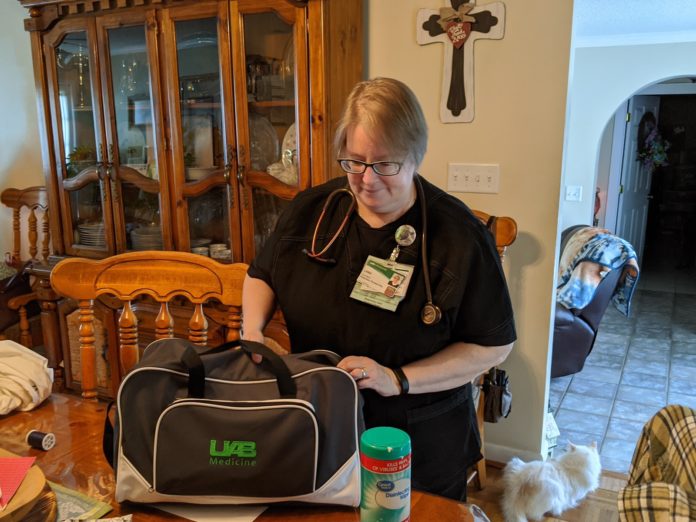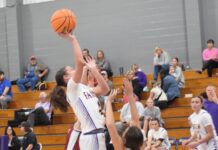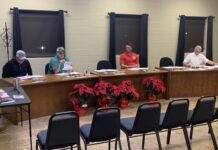
CULLMAN COUNTY, Ala. – On the front lines of the battle against COVID-19, doctors and nurses are getting a lot of headlines, and deservedly so. Hidden away in the medical matrix, though, is a group of professionals whose role places them squarely- and literally- in the face of the pandemic. Most of the mechanical ventilators that news people keep talking about are being run by respiratory therapists (RTs).
Ashley Lancaster, Respiratory Therapy program director for Wallace State Community College, told The Tribune in a message:
“There are so many people that had never even heard of Respiratory Therapists until COVID-19 hit our nation, or there was a common misconception that the only thing RTs can do is give breathing treatments, but we are so much more than that!
“RTs care for a variety of patients from all different walks of life. We provide life-saving treatment to a wide range of patients – from individuals suffering from trauma, COPD, asthma, stroke and heart attacks to premature infants born with heart or lung defects. We work closely with all members of the healthcare team and can specialize in different areas of healthcare. A therapist’s daily responsibilities depend on what area of healthcare they are employed: adult, pediatric or neonatal care, critical care transport, home health, PFT labs, pulmonary rehabilitation, etc.
“In a shift at a hospital, we may perform breathing treatments and provide oxygen to relieve shortness of breath or coach a patient through breathing exercises to prevent pneumonia or a collapsed lung. We obtain arterial blood gases to check how well a patient is ventilating and oxygenating and EKGs to check heart rates and rhythms. We respond to all Code Blues (cardiopulmonary arrest) throughout the hospital and may need to intubate someone and put them on a ventilator to keep them alive. We manage patients who are already on a ventilator and/or extubate someone to take them off a ventilator. The list is endless.
“Respiratory therapists can work in a pulmonary function testing (PFT) lab performing tests to assist a physician in diagnosing a patient with lung disease or at a pulmonary rehabilitation facility creating a plan to improve the quality of life for a patient suffering from cardiopulmonary problems. We can be found on helicopters, planes, or ambulances taking critically ill patients to different facilities if we work in critical care transport. We may be employed with a home healthcare company and bring medical equipment to your house, perform regular physical assessments to help you stay out of the hospital, and teach you and your family different ways to cope with your health problems.”
Oscar Goodwin, a Wallace State RT graduate who is the night shift RT supervisor at Decatur Morgan Hospital, told The Tribune, “You see a lot of politicians and a lot of people on TV or the internet that praise doctors and nurses, and we love those doctors and nurses; we work side by side with them, but you barely ever hear about respiratory therapists who manage these ventilators.
“And they talk about having ventilator shortages. I looked at the most recent federal prediction for Alabama (available at https://covid19.healthdata.org/united-states-of-america); right now it’s showing that we shouldn’t have a shortage of ventilators, but even if we don’t have a shortage of ventilators, we might have a shortage of respiratory therapists who run those ventilators, setting them up.
“It’s life support, and we’re the ones having to manage that, deal with that, and so we’re right there up with them getting the tube put in their mouth, which is like the most vulnerable spot, if they’re COVID positive, to be right there in their face to stick the tube down their throat. And so, you know, that’s a lot of danger we’re putting ourselves in.”
The medical world is short on RTs right now, and many RTs work full-time- three 12-hour shifts per week- and put in part-time shifts at other hospitals on their days off. WSCC is working to help ease the burden, both by graduating a class on time this semester despite the disruption, and by providing student therapists who will work while continuing their studies.
Lancaster said, “WSCC’s Respiratory Therapy Program has 31 students that are currently working in the field at hospitals across Alabama. Our students are able to take care of the patients in areas that still need respiratory therapy but aren’t as critically ill as those diagnosed with Coronavirus. This allows more experienced therapists to be available for COVID-19 patients. A lot of patients diagnosed with COVID-19 are being placed on ventilators to breathe for them. After they are on the ventilator, it’s not just about pressing buttons and writing numbers on a chart. The ventilator has to be managed by an expert on the modes of ventilation, how changes to the ventilator will affect the patient due to their underlying disease process, and much more.
“We have 38 students who will be graduating in May. The program accepts 44 applicants each Fall and we are accepting applications now through June 1st. Students can graduate in 5 semesters. After graduation, students are eligible to take the Therapist Multiple Choice Examination (TMC) given by the National Board for Respiratory Care (NBRC). If they pass with the low-cut score, they are a Certified Respiratory Therapist (CRT). If they pass with the high-cut score, they are a CRT and eligible to sit for the Clinical Simulation Examination (CSE) to become a Registered Respiratory Therapist (RRT). After passing the boards, the newly designated CRT or RRT will apply for a license from the Alabama State Board of Respiratory Therapy (ASBRT).
“During this unprecedented time, both the NBRC and ASBRT have been working diligently to support the RT community. The NBRC has waived fees to obtain immediate access to credential verification and automatically updated credentials that were set to expire March 31, 2020 to a new expiration date of December 31, 2020. The ASBRT has allowed emergency licensure classifications for reinstatement of licenses, licensure by reciprocity, and temporary licenses.”
The final word
Goodwin shared, “Respiratory therapists: they are the experts in cardiopulmonary with the lungs. And we have the same education as nurses do; we go the same amount of years for associate, for bachelor’s, for master’s. We have the same education as nurses, and we deal with every type of patient, from premature babies born to end of life support on the vent. We’re the ones who put them on that, manage their life support; if they get better, we’re the ones who take them off, and if they don’t get better, we’re the ones who terminally extubate them- ‘pull the plug’- that’s us.
“So, not a lot of people know that it’s us who do that, respiratory therapists. So we have a lot of stress, a lot of burdens on us, and I just want the world to know we exist.”
Lancaster concluded, “Most of us never have to even think about the act of breathing. It’s one of the scariest feelings in the world when you can’t breathe and that’s where RTs come to the rescue. We are by your side, fighting right there with you, encouraging you the whole time, and hopefully able to provide some relief.
“When you have someone in front of you that feels like they are drowning, so desperate for just one breath, and you are able to help, it gives you such a feeling of satisfaction. Just seeing that look of relief finally pass across their face is one of the most rewarding parts of the job for me.”
Copyright 2020 Humble Roots, LLC. All Rights Reserved.





























